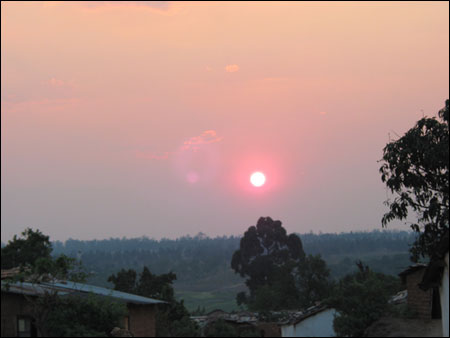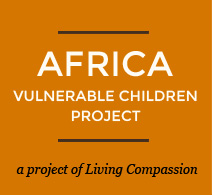Thursday was an early start. Gershom met me at the Guest House at 8 o'clock, and we headed for the Friary. Before this year we have always stayed at the Franciscan Friary, but they were not able to accommodate us when we came in July due to a large celebration they were hosting. Although we miss spending time with the Brothers, we are grateful to have found our new home--St Joseph's Guest House--with its convenient proximity to downtown.
I met briefly with Brother Camillo, one of several brothers of European descent who has been in Zambia so long he is more African than European. He helped me with information about getting an affordable calling card to use a cell phone for international calls. I noticed that Brother Joseph's car was in the parking lot so I stopped over to greet him as well. He is one of the Brothers we spent a good deal of time with in years past. He took an interest in who we are and what we do, and even asked for meditation instruction from Alex. He said he is doing well and still enjoying his job coordinating the novitiates (Brothers just entering the order). They have quite an international crew this year with Brothers from Ghana, Tanzania, Kenya, Botswana, and Zambia.
We then traveled across town to the internet cafe. Though email is laboriously slow (we have gotten so spoiled with our high-speed wireless connections at home), it is a necessity for keeping the U.S. team in the loop--especially with Cheri gone.
Thirty minutes and only five emails later, I finished up, and we proceeded to Kantolomba to meet with the District Health officers to lay out a plan for garbage collection. Unfortunately, our new friend Patrick (Director of the Health Department) was not able to join us, but it was a fabulous meeting nonetheless.
Attending were two staff members from the Health office (one man, one woman), an RDC representative, the Coordinator, Theresa, and myself. Everyone said that distributing plastic garbage bags to use for trash pick-up would not work. They explained to me that the bags would be gold in this community and would be used for anything but trash collection. We hatched a plan to identify four temporary dumpsites where people drop off trash. People will use their own household containers (old mealie meal sacks, buckets, etc.) to bring the trash to the sites and dump it, keeping the container for other uses. Everyone agreed that paying a small fee for each bucket of trash would be incentive for people to participate and a good way to support the local economy. The female health worker expressed concern, asking if we really wanted to pay the men to participate in the program. Though I was quite sure I knew where the question was coming from, I inquired anyway. She explained that when they had first driven into Kantolomba that day (10:00 a.m.), a man had stumbled over to their car asking if they had been calling him. No, they explained, they were just waiting for a meeting. When they told him who they were waiting for, he hopped in the back of their truck and offered to escort them to our school site. When they arrived at the school, he came around to the car window and asked for payment so he could buy more beer. The health worker told the story laughingly, asking "Do you really want to pay the men so they can drink?" She had spoken to what has become the clear theme of this trip: we must empower the women.
Theresa and I explained that we shared her concern, and yet the main goal of this particular project is cleaning up Kantolomba quickly before the rains arrive. Economic empowerment will be left to the other, longer-term endeavors. She understood and agreed. From all we have seen, heard, and read, economic empowerment of women has the greatest potential to turn around the entire culture. As women change, so do children, the next generation. In many ways, hope for the men rests with the empowerment of women.
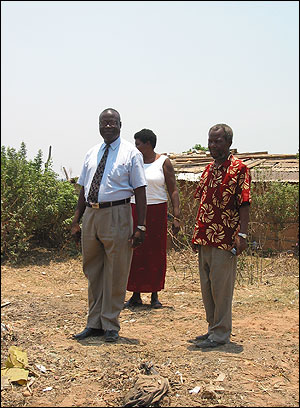
Before the meeting ended, one of the health workers asked the Coordinator (now the new Area Counselor to Kantolomba) what his plan is for clearing the drainage ditches before the rains begin. The Counselor explained that he is waiting for government funding, which should come soon. Everyone agreed that "soon" would surely be well into the rainy season, if at all. We decided to include clearing the ditches as part of our plan, recognizing that blocked drainage equals cholera and rampant malaria. We planned a meeting for 10:00 a.m. Saturday (the whole community of Kantolomba will be invited) and decided that asking for community volunteers to dig out the ditches will be an agenda item.
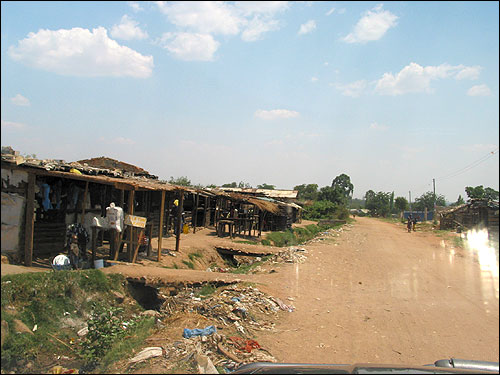
Drainage ditched filled with garbage
After the meeting, we drove around the compound and identified the four dump areas. We chose sites so that no one has to walk too far from her/his home to bring the trash. The RDC representative will speak with the appropriate parties to be sure each site is approved by the community.
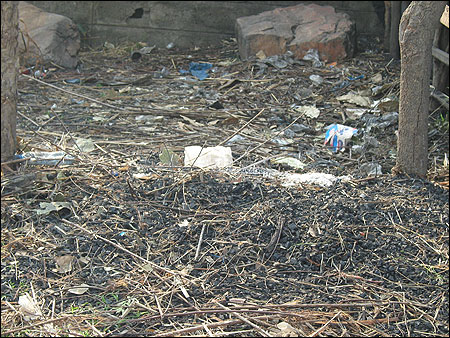
We stopped at the potter's house to see how she is progressing with the large order we placed for pots to sell through Keep It Simple as a fundraiser for the projects here. We purchased the 35 she has completed and thanked her for her beautiful work.
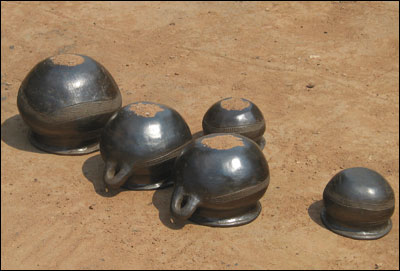
Walking back to the car, we ran into Chileshe, the teenage boy who is helping us with our informal census of Kantolomba. We are calling it "informal" to avoid what could be a political difficulty if our numbers contradict what the government publishes. We will use our statistics only for the purposes of our projects. Theresa asked him why he was not in school, and he explained that he had been "chased." I immediately thought he had been bullied by other children, and my hackles were already rising, when he explained that his teachers would not let him in school because his family has not paid his fees in full. I learned that "chased" is the term used for being turned away for not paying. We took his full name, name of his school and teacher, and told him that we would like to pay his school bill as a way of thanking him for his help with the census.
On our way back to town, we stopped at Lubuto High School to meet Chileshe's vice-principal. It is clear that this was a very nice school in its day. It was built in 1975 as part of a World Bank project. There has apparently been no plan to maintain the school.
I told the vice-principal I imagined a student not able to pay his/her fees was a common problem. He said many of the children have no parents and no one to pay. He said NGOs (non-governmental organizations--like Living Compassion) pay for some of them, and the school has a small stipend to cover some. I asked if they "chase" the students if they have not paid. He replied that there have been times when they have resorted to that, but not recently.
I asked Theresa about the "chasing," worried that Chileshe had lied to us about his reason for not being in school. Unfazed and quite confident in her projection, Theresa explained that the vice-principal had lied, that he was afraid if he said they had chased students away, I would keep asking questions and would accuse him of not caring for the students. There are always more subtle levels of Zambian culture and communication for us to learn.
Theresa and I went back to the Guest House for a budget meeting. Having just done all of the Kantolomba grocery shopping a couple of days before, we were equipped with our receipts and ready to walk through the budget line-by-line. It was a very helpful process for both of us. We were able to update the budget and see what a current, accurate figure is for the cost of the projects.
We then headed off to the Savoy to meet briefly with Martin to collect some finished sewing items before going to the next computer lesson. We met Pauline, Mr. Kayula, and Martin in the lobby and had a helpful, impromptu discussion about costs. Up to now we have been providing the chitenge material for Martin, and then paying him for each item he completes–a cumbersome process. We realized it would be a good business decision to have him buy the cloth. In the few minutes before the class, we calculated transport, sewing machine maintenance, thread, chitenge, and lining material. We can now take these figures and propose a new price to Martin for each item, and he (a local) can do the shopping. It is invaluable to have a team of people in on these kinds of discussions to help ensure that we are getting accurate information about costs.
Theresa and Mr. Kayula went across the street to begin the computer lesson, and I met with Pauline about ways she might be involved in Living Compassion. She is sharp, motivated, and eager to assist. As the lesson was finishing up, I checked email, and then we all finally piled into the car to go home.
There was a delightful 10-minute rain while I was preparing my dinner. Apparently, it was very localized as no one other than those at the Guest House said it rained at their house that evening. A special gift for us, perhaps.
